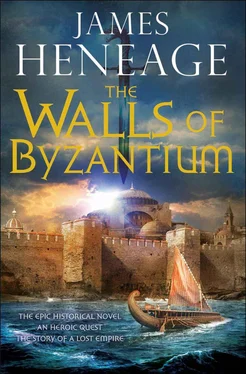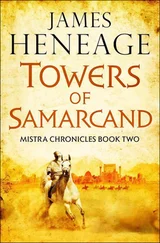James Heneage - The Walls of Byzantium
Здесь есть возможность читать онлайн «James Heneage - The Walls of Byzantium» весь текст электронной книги совершенно бесплатно (целиком полную версию без сокращений). В некоторых случаях можно слушать аудио, скачать через торрент в формате fb2 и присутствует краткое содержание. Жанр: Исторические приключения, на английском языке. Описание произведения, (предисловие) а так же отзывы посетителей доступны на портале библиотеки ЛибКат.
- Название:The Walls of Byzantium
- Автор:
- Жанр:
- Год:неизвестен
- ISBN:нет данных
- Рейтинг книги:3 / 5. Голосов: 1
-
Избранное:Добавить в избранное
- Отзывы:
-
Ваша оценка:
- 60
- 1
- 2
- 3
- 4
- 5
The Walls of Byzantium: краткое содержание, описание и аннотация
Предлагаем к чтению аннотацию, описание, краткое содержание или предисловие (зависит от того, что написал сам автор книги «The Walls of Byzantium»). Если вы не нашли необходимую информацию о книге — напишите в комментариях, мы постараемся отыскать её.
The Walls of Byzantium — читать онлайн бесплатно полную книгу (весь текст) целиком
Ниже представлен текст книги, разбитый по страницам. Система сохранения места последней прочитанной страницы, позволяет с удобством читать онлайн бесплатно книгу «The Walls of Byzantium», без необходимости каждый раз заново искать на чём Вы остановились. Поставьте закладку, и сможете в любой момент перейти на страницу, на которой закончили чтение.
Интервал:
Закладка:
James Heneage
The Walls of Byzantium
PROLOGUE
CONSTANTINOPLE, 12 APRIL 1204
At first he didn’t hear them.
Alexios V, Emperor of Byzantium, heard only hoofbeats from his balcony overlooking the Hippodrome. The ghosts of charioteers past.
The cough came again and the Emperor turned.
Standing between the pillars were four men of his Varangian Guard. All were over six feet tall and had fair hair that fell in plaits either side of faces cracked with fatigue. They carried axes and their armour was spattered with blood.
The Varangopouli. Thank God for the Varangopouli. Give me an army such as these .
‘Where are the Franks?’ he asked.
A Varangian stepped forward. His voice was hollow with exhaustion. ‘Within the city, Majesty. They managed to enter through one of the sea gates. They got behind us.’
There was a pause. Metal scraped on metal as one of them shifted pressure from a wound.
‘The Guard stood firm, lord.’
The moon emerged from behind a cloud and its light fell upon eyes that hadn’t closed in days. Alexios had known the commander of his guard for thirty years. He put his hand on his shoulder.
‘I don’t doubt it, Siward. When has it not?’
A woman’s scream came from below, then the crash of a falling building. The Emperor looked down.
‘A hundred and forty years, Siward. You, your father, his father … all those years.’ He looked up and smiled. ‘Now your Emperor needs one more service.’
Alexios stepped forward and looked at each man in turn. ‘Follow me,’ he said.
The five men’s footsteps echoed through the corridors of the empty palace until they arrived at a courtyard silhouetted by flame. They walked across it to a small door. The Emperor pushed it open and led them down a steep flight of steps, worn with age.
At the bottom, Siward took a torch from its sconce and lit their way across a hall to a door in the far wall. The Emperor reached up to the heavy lintel and moved a stone engraved with a double-headed eagle.
Slowly, slowly, the door creaked open and they entered a large, circular room fetid with dust. Lifting the torch, Siward looked around him and saw dismembered heads stare out from the shadows. Constantine, Gratian, Justinian and Basil the Bulgar-slayer. Eight centuries of emperors looked out from their plinths with disdain.
In the centre of the room was a plain altar.
The Emperor turned. ‘Move the altar. There’s a passage beneath.’
In a square next to the great church of Hagia Sophia in Constantinople stood the much smaller church of St Olaf, the church of the Varangopouli. Beside it was a narrow street that led to the Harbour of Hormisdas.
The Franks had yet to reach this part of the city, but they were near. Sounds of fighting were coming from the direction of the Iron Gate, where they’d made a second breach in the walls.
The church door opened and, one by one, the Varangians stepped into the street, silently fanning out to form a wall of shields. Then a single casket appeared, supported on poles carried by four palace servants.
Siward brushed the dust from his cloak and raked the street with his axe-head. He looked behind. The casket had reached a small square and its carriers were hurrying towards a sea gate that opened on to the harbour jetty beyond.
But someone was there before them.
A merchant and his wife were on their knees, pleading with the soldiers guarding the gate to let them through. The woman held part of her dress to her mouth against smoke that billowed from a street behind.
Siward backed towards them, then stopped to listen. There were men on the other side of the smoke.
‘ Saint Denis et Montjoie !’
A score of wraiths rose up, monstrous, metal figures emerging beneath a banner of lilies. They held shields and maces and fierce animals reared high on their helmets. The four Varangians were outnumbered five to one but there were no better soldiers in the world. Their axes swung and sliced their way through the finest Milanese armour and the Franks fell at their feet, their skulls crushed and their limbs pumping blood on to the stone. And as they fought, the men backed inch by inch towards the open gate. The casket was through but they were running out of time.
The merchant and his wife were pressed against the wall between the Varangians and the gate, transfixed by the slaughter.
‘Get away!’ yelled Siward.
The woman fell to her knees, clutching his leg in her terror. Siward glanced down at her.
I cannot save her but I can save the casket .
He reached down and hauled the woman to her feet. She was pretty enough. He flung her towards the French. She fell at their feet, her dress rucked up to reveal a thigh. It was enough. One of the Franks leant down and tore open her bodice. Wrenching open his visor, he fell on her as his companions roared.
‘Now!’ yelled Siward, and the four Varangians turned and ran through the gate, barring it behind them.
On the jetty, the boat was ready to sail. It was a squat, round-bottomed merchant vessel that flew the flag of Venice. Siward looked up.
Will it fool them?
The casket was on board and the sailors stood ready to cast off. The Varangians boarded and the ship was pushed out into the Propontis, the wind snapping its sails taut as they were hauled up the mast. Gathering speed, they passed platforms with giant engines of war manned by half-naked men who cheered as their fireballs exploded against the city walls. Siward saw another part of the sea wall slide into the sea.
It won’t be long now .
He looked out to sea. His ancestors had sailed this way in their longboats from an island far to the west, an island shrouded in mist called England . They had passed the deep ruins of Troy and into the Sea of Marmara to arrive at the fabled city of Miklagard as the dawn had ignited the gold of its palaces and churches. They had sailed to escape the Normans who had killed their king, put an arrow through his eye. They had come to seek service with an emperor who needed men of courage and skill to fight his own Normans. They had come with hatred in their hearts and they had become the first English Varangians.
Now they were sailing away. Siward looked down at his sword, at the dragon’s head that was its pommel. It was all he was taking with him.
Except the casket.
A sudden gust billowed the sails and the ship lurched forward. Then it was through the blockade and heading for the open sea. He hauled himself to his feet and called out to the captain: ‘You know your course?’
The man shook his head. ‘South only,’ he shouted. ‘They said you’d tell me where.’
Siward took one last look at the city. It could have been the salt spray or tears that clouded his eyes. Then he turned his head to the south.
‘Mistra,’ he said. ‘We sail to Mistra.’
PART ONE
CHAPTER ONE
THE CITY OF MONEMVASIA, SPRING 1392
For birds migrating south that day, the journey down the coastline to Cape Maleas offered a view unchanged since their species began.
On one side, the deep, deep blue of the Mirtoon Sea spread its unabbreviated calm out to the horizon. On the other, the Despotate of Mistra offered mile after mile of rugged hinterland, wild with forest and mountain.
Until Monemvasia.
There, the Greek Peloponnese extended a crooked finger into the sea and on its knuckle perched a city where twenty thousand souls bustled within walls that seemed to grow out of the rocks beneath them.
Scattered across the sea were the white sails of merchantmen waiting in the roads to enter the city’s port to the north and, closer in, closer to the rocks on which the city stood, were the figures of four boys lying on their backs in the water.
Читать дальшеИнтервал:
Закладка:
Похожие книги на «The Walls of Byzantium»
Представляем Вашему вниманию похожие книги на «The Walls of Byzantium» списком для выбора. Мы отобрали схожую по названию и смыслу литературу в надежде предоставить читателям больше вариантов отыскать новые, интересные, ещё непрочитанные произведения.
Обсуждение, отзывы о книге «The Walls of Byzantium» и просто собственные мнения читателей. Оставьте ваши комментарии, напишите, что Вы думаете о произведении, его смысле или главных героях. Укажите что конкретно понравилось, а что нет, и почему Вы так считаете.










